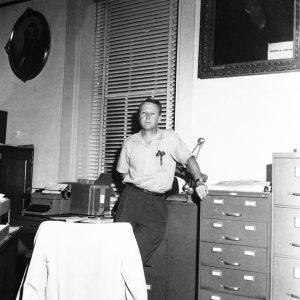calsfoundation@cals.org
Francis Irby Gwaltney (1921–1981)
Francis Irby Gwaltney prospered as an author in the 1950s, writing some of the most significant novels dealing with the South. He was a scholar, a professor, and a longtime friend of Norman Mailer, with whom he conducted an extensive correspondence after meeting him in the army during the Luzon Campaign in the Philippine Islands sometime after 1944. Gwaltney’s most famous work, The Day the Century Ended, is regarded as a courageous account of the social conditions in the South and one that captures the spirit of Arkansas in particular.
Francis Gwaltney was born on September 9, 1921, in Traskwood (Saline County), thirteen miles south of Benton (Saline County). His father, a physician, died in February 1923. His mother, Mary Effie Irby Gwaltney, cared for herself and her three children. They moved to Blue Mountain (Logan County) and eventually to Charleston (Franklin County) in 1928.
After suffering a blood clot on her brain, Gwaltney’s mother deteriorated mentally and often was referred to in Charleston as eccentric or insane. She died at age fifty-five. Gwaltney started to work odd jobs after his mother died. At fourteen or fifteen, he became a projectionist in a movie theater, a position that stirred his imagination and compensated somewhat for his lonely social life. He played baritone saxophone in the Charleston High School Band; during this time, he formed a friendship with classmate Dale Bumpers, who was later governor of Arkansas and a U.S. senator.
Gwaltney showed great allegiance to his family. He maintained contact with his sisters, who had married and moved to California, by phone and through long letters. The large Irby family provided far-reaching support. His uncles provided role models, as well as encouragement and occasional monetary loans.
Gwaltney left Charleston shortly after World War II began. He subsequently lived with his sister Nancy Lee near Los Angeles, California, for several months.
On June 6, 1942, he enlisted in the army. He was trained as a radio operator and was deployed on November 29, 1945, with the 112th Cavalry Regiment in the Asiatic Pacific Theater. That assignment led to Gwaltney’s friendship with Mailer and provided the combat experiences that are recounted fictionally in The Day the Century Ended. He was awarded several medals for his service in the Philippines.
After being honorably discharged, Gwaltney returned to the United States and, after a brief stay in California, returned to Arkansas State Teachers College (now the University of Central Arkansas) in Conway (Faulkner County) and obtained his high school diploma (some colleges granted high school diplomas at the time). He then enrolled in college, eventually earning a degree in English at the University of Arkansas (UA) in Fayetteville (Washington County). At college, he met Emma Carolyn Calhoun, whom he married on August 19, 1947, and with whom he had a son and a daughter. After earning his master’s degree in English in 1950 at UA, Gwaltney taught high school English in Fayetteville. Later, he taught at Arkansas Tech University (ATU) in Russellville (Pope County) and, after that, returned to Conway, where he opened a bookstore. He also taught briefly at Louisiana Tech University in Ruston and later returned to ATU, where he co-founded the creative writing department.
Gwaltney wrote eight novels. His first published novel was Yeller-Headed Summer (1954), but his next, The Day the Century Ended, was the most successful critically and commercially. It was reviewed favorably when it was published in 1955 and a year later, when it was made into a movie (titled Between Heaven and Hell) starring Robert Wagner, Buddy Ebsen, and Broderick Crawford. The story concerns the tensions between rich and poor Arkansas soldiers in the South Pacific Theater brought together by the war and explores how the events changed them. His other novels include Destiny’s Chickens (1973) and Idols and Axle Grease (1974), the latter based upon his childhood in Charleston. He also wrote teleplays for the television shows The Fugitive and The Alfred Hitchcock Hour; one of his episodes of The Alfred Hitchcock Hour was nominated for an Emmy.
Gwaltney died on February 27, 1981, and is buried in Crestlawn Memorial Park Cemetery in Conway.
For additional information:
Francis Irby Gwaltney Papers. Special Collections. University of Arkansas Libraries, Fayetteville, Arkansas.
Klein, Marcus. The American Novel since World War II. Robbinsdale, MN: Fawcett Publications, 1969.
“State Novelist Dies at Age 59.” Arkansas Gazette. February 28, 1981, pp. 1A–2A.
Jim Kelton
University of Arkansas, Fayetteville
 Francis Gwaltney
Francis Gwaltney 




Greatest prof ever. Class of 1979.♡♡♡